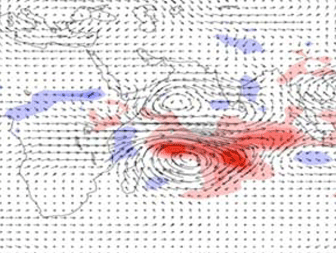NASA study shows global warming will diminish rainfall in East Africa, worsening hunger
NASA study shows global warming will diminish rainfall in East Africa, worsening hunger
mongabay.com
August 6, 2008
A new NASA-backed study has found a link between a warming Indian Ocean and reduced rainfall in eastern and southern Africa. The results suggest that rising sea temperatures could exacerbate food problems in some of the continent’s most famine-prone regions.
Analyzing seasonal rainfall data over the Indian Ocean and the eastern seaboard of Africa from 1950 to 2005, researchers found that rainfall in eastern Africa during the rainy season has declined about 15 percent since the 1980s. More rain is apparently falling over the ocean than land. Ethiopia, Kenya, Tanzania, Zambia, Malawi and Zimbabwe have been affected.
“The last 10 to 15 years have seen particularly dangerous declines in rainfall in sensitive ecosystems in East Africa, such as Somalia and eastern Ethiopia,” said co-author Molly Brown of NASA’s Goddard Space Flight Center. “We wanted to know if the trend would continue or if it would start getting wetter.”

Arrows show the simulated movement of moisture, and blue to red colors indicate variations in cool to warm sea surface temperatures. Credit: Mathew Barlow/University of Massachusetts |
Ten of the 11 models showed that though 2050, rainfall over the Indian Ocean would continue to increase, depriving East Africa of rainfall.
“We can be quite certain that the decline in rainfall has been substantial and will continue to be,” Funk said. “This 15 percent decrease every 20-25 years is likely to continue.”
The researchers then evaluated the impact of declining rainfall on food production. Should the drying trend continue, the team found that the number of undernourished people will increase by more than 50 percent in eastern Africa by 2030. However boosting agricultural capacity in the region through seed and fertilizer use and crop innovation could mitigate some of the damage, reducing the number of undernourished people by 40 percent.







